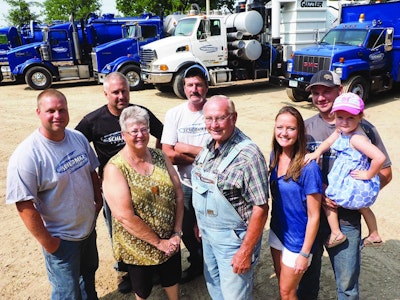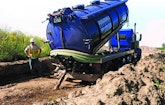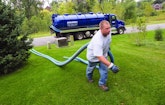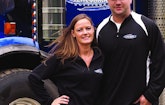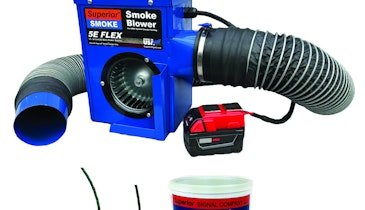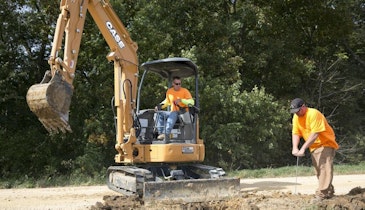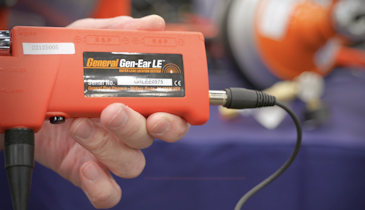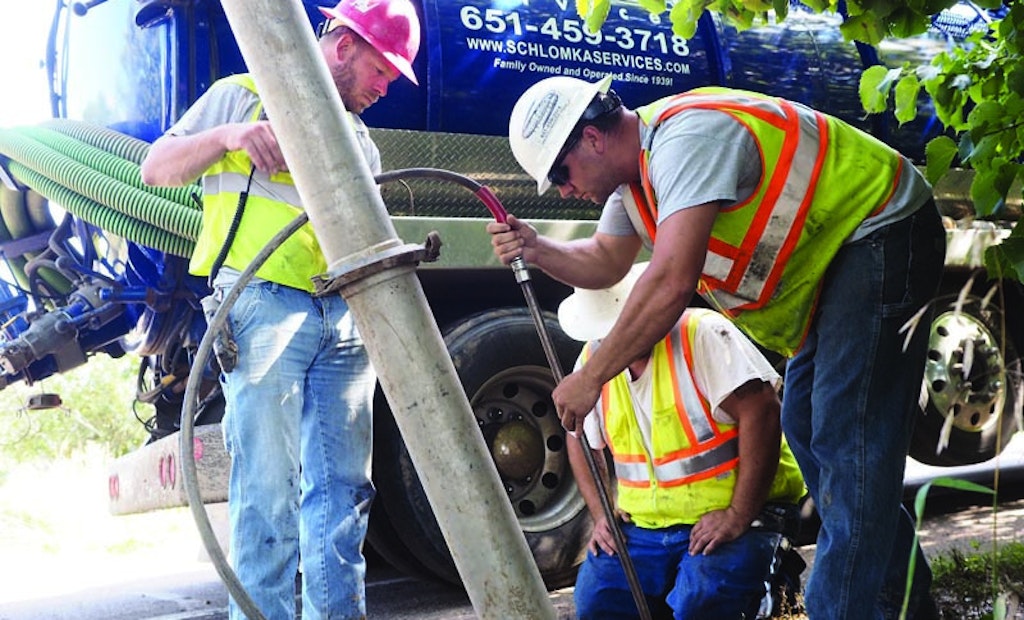
Interested in Pumps?
Get Pumps articles, news and videos right in your inbox! Sign up now.
Pumps + Get AlertsWhat do you get when you combine a group of self-admitted workaholics who can’t say no to requests for additional services? In Hastings, Minn., an outlying Twin Cities suburb, the answer is Schlomka Services LLC, a family-owned business that parlayed a can-do attitude into a diversified industrial/commercial cleaning and residential septic-pumping outfit.
“We do anything and everything,” says Larry Schlomka, owner of the company, which dates back to 1939 when his grandfather, Carl Schlomka, and his brother, Roy, started a cesspool-cleaning business. In 1968 his uncle and aunt, Hank and Carol Schlomka, purchased the business.
“Hank’s motto always was, ‘We can do anything.’ And nothing has changed in that regard,” Larry Schlomka says. “That’s become kind of our niche – doing the jobs that no one else wants to do or doesn’t have the equipment available to do so.”
FAMILY FIRST
Andrea Sonnek, 32, Larry Schlomka’s cousin and the company’s office and operations manager as well as its heir apparent, agrees. “We’re all workaholics,” she says with a laugh. “We don’t want to see all of my grandpa’s hard work go by the wayside.” If everything proceeds according to plan, Sonnek – who graduated from the University of Minnesota with a degree in sociology – will become the fourth-generation owner of the company after Larry retires. Her husband, Aaron, also works for the company.
Hank Schlomka expanded the septic business into industrial-cleaning services for area refineries and pipeline owners. As he prepared for retirement, Hank sold the industrial-cleaning branch of the company, Schlomka’s Vac Truck Service Inc., to his son and daughter-in-law, Donny and Susan Schlomka, in 2000; sold the septic-pumping division of the business to Larry in 2006; and sold a portable-restroom arm of the company, Schlomka’s Portable Restrooms & Mobile Pressure Washing LLC, to his grandson (Donny and Susan’s son), Danny Schlomka, in 2007.
The industrial-services side of the business has continued to grow while septic pumping now accounts for about one-third of business volume.
Schlomka Services pumps wastewater holding tanks, drilling mud from geothermal and cross-directional boring projects, commercial sewage treatment systems, grease traps, sand pits at car washes and auto-repair centers, and sumps and gutters in underground parking facilities. The company also cleans and maintains municipal facilities such as lift stations, storm sewers, catch basins, sanitary sewer lines, wastewater treatment plants and waste digesters. Then there’s cleaning oil-and-water separators in railroad yards and scale pits at factories, leachate hauling … the list goes on and on.
“We’ve evolved a lot since 2006,” Sonnek notes. “Part of that comes from the fact that most residential customers need our services every two or three years where commercial business is daily. Plus we’re driving around with these big trucks every day that advertise who we are … so we also get a lot of word-of-mouth referrals. And we don’t say no to anything unless we’re simply not available.”
EQUIPMENT CORNER
Providing so many services requires a large fleet of equipment. Schlomka Services owns five vacuum trucks:
- 1999 International with a 3,500- gallon stainless steel tank made by Ibex Inc. and a Hibon blower (1,600 cfm).
- 2009 Sterling with a 3,000-gallon steel tank and Hibon blower (5,250 cfm) built out by Guzzler Manufacturing, Inc.
- 2011 Kenworth T800 with a 5,000-gallon stainless steel tank, built by Progress VacTruck with a National Vacuum Equipment (NVE) blower (931 cfm).
- Two rig trucks built out by LMT Inc., one on a 2007 Kenworth T800 chassis with a 5,000-gallon steel tank and a ROBUSCHI blower (494 cfm) and the other on a 2015 Kenworth T800 with a 5,000-gallon stainless steel tank and an NVE blower (931 cfm).
“I prefer to use blowers, not vane pumps, because they’re more powerful and you can run them all day,” Larry Schlomka says. “They don’t overheat … and can take a little more abuse.” The powerful blowers also come in handy because the jobs the company takes on often require long hose runs, he notes.
In addition, the company owns two waterjetting trucks built by SRECO-FLEXIBLE, one built on a 2000 GMC C8500 chassis with an FMC Technologies pump (2,500 psi at 75 gpm) and a 1,500-gallon water tank, and the other built on a 1978 Ford F-700 with a Wheatley pump from National Oilwell Varco (2,000 psi at 50 gpm) and a 1,000-gallon water tank.
“We use the trucks for sewer jetting in private communities and sometimes they serve as just water trucks when we’re cleaning scale or mud. It just depends on the day,” he says.
The Guzzler performs hydroexcavating, which provides more versatility for the company. It’s mainly used, though, for vacuuming deep pits filled with either wet or dry materials, Schlomka says.
“The other day we had three separate contractors call in for jobs and we could handle all of them,” he says, pointing out the value of a diverse fleet of equipment. “One was a hydroexcavating job, another one involved removing dirt from a 300-foot-long crevasse in a city street and the third one required us to vacuum up boring mud from a directional-drilling project.’’
EFFICIENCY MATTERS
The company has evolved internally since 2006 with Sonnek heading up modernization efforts such as computerization and developing a website, which she says generates about a dozen or so email requests for job quotes every month. She also uses Facebook to promote the company.
To stay organized and run efficiently, Sonnek uses QuickBooks from Intuit Inc. for bookkeeping and invoicing and Service CEO software, made by Marathon Data Systems, for compiling customer data, scheduling drivers and printing job tickets. She also relies on Google Drive, a software platform that provides easy storage and universal access to files and documents, as well as GroupMe, an app developed by GroupMe Inc. for shared texting.
“Our drivers can use Google Drive to keep track of regulatory things, like the amount of gallons of waste they pump, so we’re not scrambling at the end of a quarter to compile three months’ worth of data for the licensing agency in St. Paul,” she explains. “It also allows us to offer same-day billing service. And GroupMe allows me to text all our drivers at the same time and see who’s available and closest when a new job pops up.”
To enhance company branding, Sonnek and Schlomka developed a company logo – a blue-and-gray graphic of a swirling cyclone – now appearing on all the company’s equipment. “All our trucks now look the same for consistent branding,” she explains. “I thought it was important for us to create a brand image with bright blue trucks and a logo.”
LOOKING AHEAD
Sonnek says she anticipates enough growth to justify hiring another driver within the next year. “Our plate is full – there’s just me, Larry, Aaron and John Hacken, a driver and operator,” she says. “If we hire another driver, all our trucks will be working at full capacity and we can look at adding to our fleet.” She also notes that her father, Bill Schlomka (one of Hank’s sons), contributes, as do friends and family members who help out during peak business periods.
Schlomka is thinking about retirement in the next 10 years, and Sonnek says there is no formal timeline for her to take over. “We still need Larry’s knowledge and experience … it’s so awesome to have him in charge because he can talk to anyone about anything and can assess what’s needed to do a job. He’s really good at solving problems and takes a relaxed approach that puts customers at ease.’’
Sonnek is not daunted by the discouraging failure rate of successive family ownership of businesses. According to the Family Business Institute, only about 30 percent of family-owned businesses survive into the second generation, just 12 percent get passed on to a third generation, and only a mere 3 percent succeed with fourth-generation ownership and beyond. She’s motivated by thinking about everything her grandfather poured into the business for so many years; in fact, he’s still actively involved despite being “retired.”
“I’m a forward thinker – a positive thinker,” she asserts. “Each year we do better and better … so I think it will just keep rolling. I’d like to think that years from now we’ll still be going strong.”
